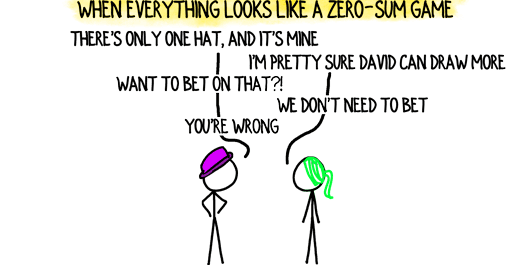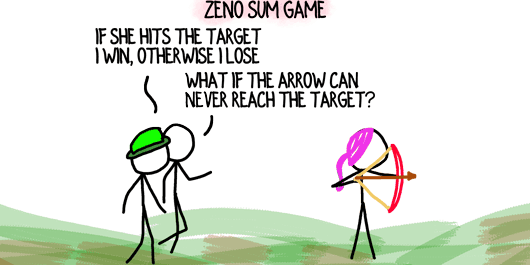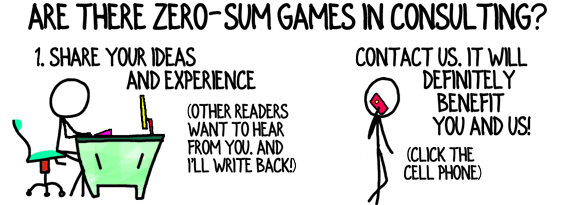Your consulting firm participates in zero-sum games, where one party’s win necessitates the other’s loss. However, often that zero-sum perspective is false. Win-win outcomes are possible and will propel your consulting firm’s progress.
For many people in many situations, “winning” too often seems to require that the other side loses.
In fact, you probably observe politicians, companies and even individual clients who lose focus on their own success in their relentless quest to undermine some other party’s gain.
Every interaction turns into a chocolate vs. vanilla encounter.
That’s distorted thinking, of course. A touch of vanilla bean often improves chocolate’s flavor profile.
Yet, that win-or-lose mindset could be blunting your consulting firm’s growth efforts.
Below are a few situations that incorrectly occur to many consultants and consulting firms as zero-sum games.
False, Zero-Sum Games
Competition for Visibility
You may view competing consulting firms’ marketing efforts as an effort to squeeze you out, leading you to feel like you should fight back.
The closer their message is to yours, the more threatening it appears. What could be worse than another cacao nibbing expert speaking at the same conference and stealing thunder from your “Cacao Nibification” framework?
Plenty.
Multiple consulting firms spreading a similar message normalizes your consulting firm’s focus and approach. Remember, clients aren’t searching for different; they buy proven and reliable.
Embrace competitors’ marketing and recognize that they’re increasing the size of the pie for your consulting firm.
Competition for Projects
What could be more obviously zero-sum than competition to win a consulting project? Either your consulting firm wins it or some other firm does.
However, that winner-take-all outcome is not always assured.
Clients frequently split projects into pieces—particularly large initiatives, undertakings that cover multiple phases, and initiatives that benefit from multiple, specialized skill sets.
In many cases your consulting firm will fare better by winning the portion of a project that you can knock out of the park while allowing a practice whose expertise is different from yours handle what they’re best at.
Not only will you deliver better results and gain a happier client, you can form a partnership with an adjacent consultancy that could yield more business for both of your firms.
Fees… You vs. Clients
If your client pays your consulting firm higher fees, you win. If they negotiate your fees down, they win. Right?
Wrong.
Consulting clients commonly believe they’re in a battle with your over project fees. Convincing them otherwise can be an exercise in futility.
The problem is exacerbated by old-fashioned firms that sell project teams by the week, day or hour. Time-based fees reinforce the focus on inputs (time, effort) rather than outcomes.
However, success-fee structures and other, creative contract terms enable your client and your consulting firm to benefit when you collaborate to achieve outstanding results.
Plus, you can show your consulting client that when they invest more into your project, they open the door for you to add resources, shift approaches as necessary mid-stream, and take other actions that will ensure the best possible outcome.
My team and I identified a handful of other, false zero-sum games that negatively affect consulting firms.
These include competition for revenue recognition between consultants, time spent on business development vs. delivery vs. training, time off vs. utilization, and investments in infrastructure vs. staff vs. profit. Some of these may warrant exploration in a future article.
In the meantime, though, I’m curious about your take on zero-sum games in consulting.
Have you encountered any false, zero-sum games in your consulting practice?
Text and images are © 2024 David A. Fields, all rights reserved.

 David A. Fields Consulting Group
David A. Fields Consulting Group 




This was wonderful. Really wonderful.
I see this so much and think, “am I the one not understanding reality or is it them?”
This scarcity obsession and zero-sum thinking is a very narrow mindset and opportunities are missed because of it.
Very insightful to connect zero-sum thinking with a scarcity mindset, Michael. They definitely can reinforce each other. Fortunately, as consultants and advisors, we have the opportunity to point out a different reality to our clients, and to open the door to the possibility of cooperation and abundance.
Thank you for adding your wisdom to the conversation, Michael!
Thanks David for the article. Agree there is an initial perception that we either “win” or “lose” projects.
However, the market is changing from big firms to small folks like us. Working with a client on one project, I realized I couldn’t help them on a new need so I suggested they bring in another firm to do a certain phase of the project. It worked out well for the client and we each benefited from working with each other during the process.
Agree that clients want proven and reliable consultants to help them.
Well said, Dave. In the United States alone, clients spend trillions of dollars on consulting and advisory work. That’s enough for you, me, most the other folks who read the article and maybe a few others too.
I’m glad you shared your thoughts, Dave.
Excellent insight! Ironically, step one for many organizations in need of help is to inject the idea that much of their world _is_ zero-sum and they have to set priorities, instead of being a money bag that people dip their hands into until it is empty.
That insight is ironic, Douglas. Even budget is not zero sum, though, because good work can increase the funds available. Also, the same money can be used creatively in multiple ways rather than just handing it off to one party.
All of that said, at some point the money does run out. Non-zero-sum doesn’t mean infinite!
I appreciate you posting your insight, Douglas!
You should check out a book I just finished “Split the Pie” by Barry Nalebuff He founded Honest Tea and sold it to Coca Cola It’s all about negotiating
Haven’t read that particular book, Irv; however, great negotiators definitely see when a false, zero-sum game is afoot. In fact, one step in the negotiation approach we teach to consultants and consulting firms is to agree with your prospect. There’s always room for agreement, and that breaks the “I’m right, your wrong” paradigm.
Thanks for the suggestion, Irv!
It’s really not easy to go beyond the zero-sum game.
Yet if we consider consulting business as a business of trust, we can say then the consulting business is also an infinite game. And according to Simon Sinek there are no winners or losers in the infinite game.
You’re right, Tomaž, that seeing beyond zero-sum can be difficult. And your point about Trust is well-taken. Trust is infinite, insofar as extending trust doesn’t limit your supply. In fact, the more you trust, the more you’re likely to create trusting as a habit. (Of course, trust is easily broken and lost, too.)
In the ultimate game of life there are arguably no winners or losers… and still, as advisors and leaders who serve others, we can help others “win” their own lives or lead better lives. That’s a noble calling for all of us.
Thanks for your uplifting comment, Tomaž.
Trust is a renewable resource.
A specific pie, however, …
That was very funny, Franziska! I trust any pie coming from you, without hesitation!